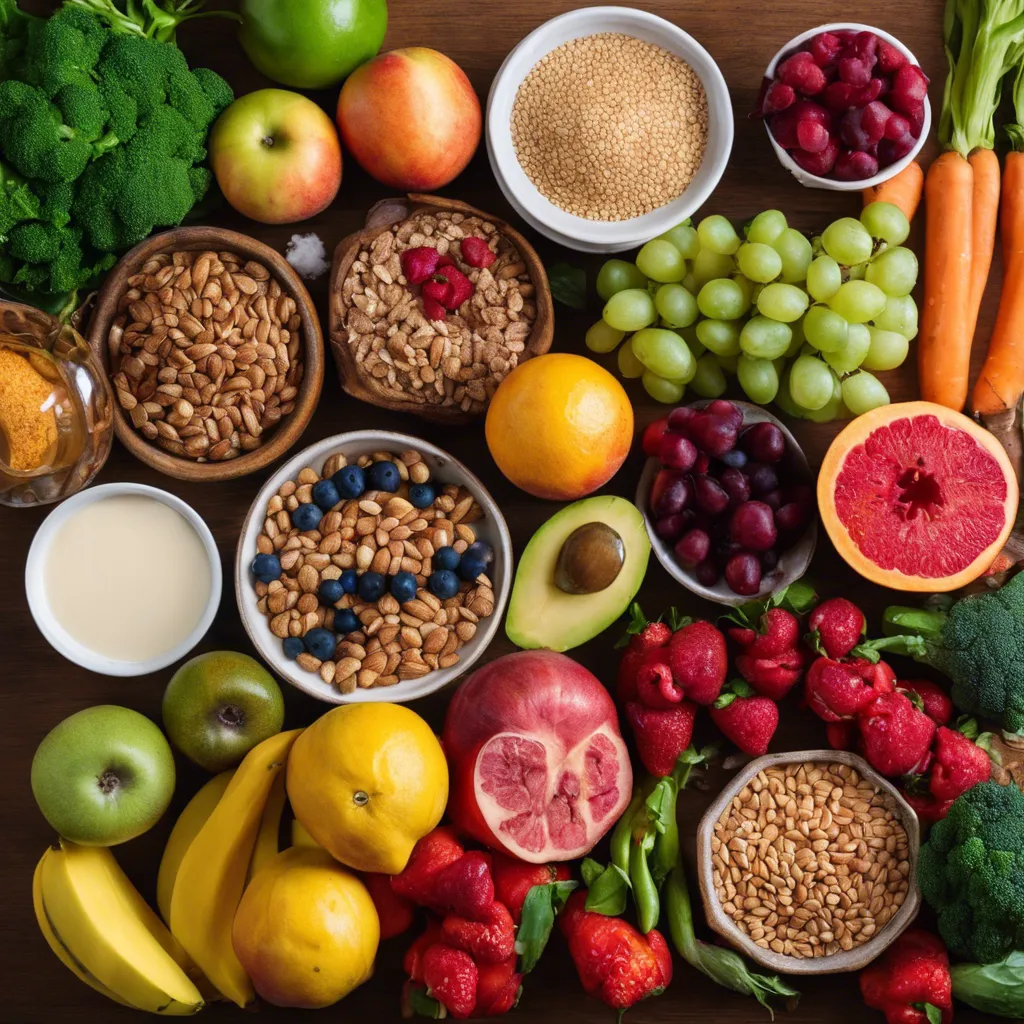Table of contents
- Mastering the Art of Blood Sugar Control
- The Influence of Diet on Regulating Blood Sugar
- The Key to Stable Blood Sugar: Must-Have Staples in Your Diet
- Cracking the Code: The Glycemic Index's Influence on Blood Sugar
- Transform Your Health with Meal Planning for Blood Sugar Control
- Transforming Your Lifestyle for Better Blood Sugar Control
- Healthy and Delicious Recipes for Managing Blood Sugar
In today's fast-paced world, maintaining consistent blood sugar levels is essential for overall health and well-being. Strategic nutritional choices play a crucial role in achieving this goal. This article delves into the importance of balanced eating habits, exploring specific foods that promote stable blood sugar control. Whether you have diabetes or simply want to optimize your health, understanding these strategies can help you make informed decisions about your diet.
Mastering the Art of Blood Sugar Control
Blood sugar levels refer to the amount of glucose present in the bloodstream. Glucose is a crucial source of energy for the body's cells and organs. Maintaining optimal blood sugar levels is essential for overall health as it directly impacts various bodily functions. High blood sugar levels can lead to complications like diabetes, heart disease, and nerve damage. On the other hand, low blood sugar levels can cause symptoms such as dizziness, weakness, and confusion. Therefore, understanding and controlling blood sugar levels is vital for promoting well-being and preventing related health issues.
The Influence of Diet on Regulating Blood Sugar
Maintaining stable blood sugar levels is crucial for overall health. Dietary choices play a significant role in regulating blood sugar, and the impact can be profound.
-
Carbohydrate Choices Matter
Carbohydrates are broken down into glucose, which directly affects blood sugar levels. Foods high in refined carbohydrates, such as white bread and sugary drinks, cause a rapid rise in blood sugar. On the other hand, choosing complex carbohydrates, like whole grains and legumes, leads to a slower and more balanced increase in blood sugar.
-
The Power of Protein
Including protein in meals and snacks can help stabilize blood sugar levels. Protein slows down the digestion of carbohydrates, preventing spikes in blood sugar. Additionally, protein promotes satiety, preventing overeating and subsequent blood sugar fluctuations.
-
Fiber for Blood Sugar Control
Fiber-rich foods, such as vegetables, fruits, whole grains, and beans, have a remarkable impact on blood sugar regulation. Fiber slows down the absorption of glucose, preventing sudden blood sugar spikes. Moreover, it promotes a feeling of fullness and aids in weight management, which is crucial for diabetes prevention and management.
-
Healthy Fats for Sustained Energy
Incorporating healthy fats, such as avocado, nuts, and olive oil, into the diet can help stabilize blood sugar levels. Fats slow down the absorption of glucose, promoting a steady release of energy. Additionally, they enhance the absorption of fat-soluble vitamins, which are essential for overall health.
-
The Impact of Portion Sizes
The quantity of food consumed plays a significant role in blood sugar regulation. Eating large portions, even of healthy foods, can lead to a sudden surge in blood sugar levels. It is important to practice portion control and eat balanced meals to maintain stable blood sugar levels throughout the day.
The Key to Stable Blood Sugar: Must-Have Staples in Your Diet
Maintaining stable blood sugar levels is crucial for overall health. Incorporating nutritious foods into your diet can help achieve this. Some key staples that help stabilize blood sugar include high-fiber foods like whole grains, legumes, and vegetables. These foods are digested slowly, preventing sudden spikes in blood sugar. Healthy fats found in avocados, nuts, and seeds also promote stable blood sugar levels. Protein-rich foods like lean meats, fish, and tofu can help regulate blood sugar. Lastly, consuming foods with a low glycemic index, such as berries, apples, and leafy greens, can provide a steady release of glucose into the bloodstream.
Cracking the Code: The Glycemic Index's Influence on Blood Sugar
When it comes to blood sugar levels, understanding the concept of glycemic index is essential. The glycemic index is a measure of how quickly carbohydrates in food are broken down and absorbed into the bloodstream, ultimately affecting blood sugar levels. Here's a breakdown of how the glycemic index relates to blood sugar levels:
- The glycemic index ranks carbohydrates on a scale from 0 to 100 based on how they raise blood sugar levels compared to pure glucose, which has a value of 100.
- Foods with a high glycemic index, above 70, cause a rapid and significant increase in blood sugar levels. These include white bread, rice, sugary snacks, and many processed foods.
- On the other hand, foods with a low glycemic index, below 55, are digested and absorbed more slowly, leading to a gradual rise in blood sugar levels. These include whole grains, legumes, fruits, non-starchy vegetables, and some dairy products.
- The glycemic index is useful for people with diabetes or those needing to manage their blood sugar levels. Choosing foods with a lower glycemic index can help prevent spikes in blood sugar and promote more stable levels throughout the day.
- Factors that can influence the glycemic index of a food include the type of carbohydrate, the amount of fiber and fat in the food, and how it is cooked or processed.
Are you looking to transform your health and maintain steady blood sugar levels? Meal planning is the key! By creating balanced meals, you can effectively manage your blood sugar and promote overall well-being.
- Include a variety of food groups: To create balanced meals, aim to include foods from all food groups – fruits, vegetables, whole grains, lean proteins, and healthy fats. This ensures that you get a mix of macronutrients, vitamins, and minerals.
- Choose complex carbohydrates: Opt for complex carbohydrates such as whole grains, legumes, and vegetables over refined carbohydrates. These complex carbs are digested more slowly, leading to a gradual rise in blood sugar levels.
- Prioritize fiber-rich foods: Fiber is an excellent nutrient for managing blood sugar levels. Include fiber-rich foods like fruits, vegetables, whole grains, and legumes in your meals.
- Incorporate lean proteins: Protein plays a crucial role in stabilizing blood sugar levels. Include lean protein sources like fish, poultry, tofu, beans, and lentils in your meals.
- Include healthy fats: Healthy fats like avocados, nuts, seeds, and olive oil provide satiety and help regulate blood sugar levels. Don't be afraid to add these healthy fats to your meals.
- Practice portion control: Pay attention to portion sizes to prevent overeating and sudden spikes in blood sugar. Use smaller plates and measure your portions to achieve balance.
- Stay hydrated: It's important to drink plenty of water throughout the day to support healthy blood sugar levels. Hydration helps with digestion and overall metabolic function.
- Monitor your carb intake: While carbohydrates are necessary for energy, keeping track of your carb intake is important for maintaining steady blood sugar. Work with a healthcare professional to determine the right amount for you.
Regular physical activity plays a vital role in blood sugar control. It helps increase insulin sensitivity, allowing cells to better utilize glucose for energy. Exercise also aids in weight management, reducing the risk of obesity-related insulin resistance. Furthermore, physical activity lowers blood sugar levels by stimulating the movement of glucose from the bloodstream into the muscles. Regular exercise can also improve cardiovascular health, lower blood pressure, and reduce the risk of developing type 2 diabetes. Incorporating regular physical activity into your daily routine is crucial for maintaining healthy blood sugar levels and overall well-being.
Healthy and Delicious Recipes for Managing Blood Sugar
When it comes to managing blood sugar levels, it's important to follow a healthy and balanced diet. Here are some delicious and nutritious recipes that can help you in maintaining stable blood sugar levels:
-
Quinoa and Vegetable Stir-Fry
This recipe combines protein-rich quinoa with colorful veggies like broccoli, bell peppers, and carrots. It's a low-glycemic index meal that can keep your blood sugar levels in check.
-
Salmon with Roasted Vegetables
Salmon is an excellent source of omega-3 fatty acids, which have been shown to improve insulin sensitivity. Pair it with a medley of roasted vegetables like asparagus, zucchini, and bell peppers for a nutritious and delicious meal.
-
Spinach and Feta Stuffed Chicken Breast
Chicken breast stuffed with spinach and feta cheese is a protein-packed dish that is low in carbohydrates. Spinach is rich in magnesium, a mineral that helps regulate blood sugar levels.
-
Berry and Yogurt Parfait
Opt for a low-sugar yogurt and layer it with fresh berries like strawberries, blueberries, and raspberries. This tasty parfait provides a good balance of protein, fiber, and antioxidants.
-
Roasted Chickpea Salad
Roasted chickpeas are a great source of plant-based protein and fiber. Toss them with mixed greens, cherry tomatoes, cucumber, and a tangy vinaigrette for a satisfying salad that won't cause blood sugar spikes.
In conclusion, making strategic nutritional choices is essential for maintaining consistent blood sugar control. By focusing on consuming a balanced diet that includes whole grains, lean proteins, and healthy fats, individuals can regulate their blood sugar levels effectively. Avoiding processed foods, sugary beverages, and excessive alcohol consumption is crucial to prevent blood sugar spikes and crashes. Additionally, incorporating regular exercise into one's routine can further enhance blood sugar control. By following these strategies, individuals can improve their overall health and reduce the risk of developing chronic conditions such as diabetes.
Frequently asked questions related to strategic nutritional choices
What are some strategic nutritional choices for consistent blood sugar control?
Some strategic nutritional choices for consistent blood sugar control include consuming a balanced diet that includes a mix of carbohydrates, protein, and healthy fats. It is important to choose carbohydrates with a low glycemic index, such as whole grains, fruits, and vegetables. Including lean sources of protein, such as poultry, fish, tofu, and legumes, can also help regulate blood sugar levels. Additionally, incorporating healthy fats like avocados, nuts, and olive oil into meals can promote better blood sugar control.
Are there any specific foods that should be avoided for better blood sugar control?
Certain foods should be avoided or limited for better blood sugar control. These include sugary beverages such as soda and fruit juices, as well as highly processed foods that are high in refined sugars and carbohydrates. It is also recommended to reduce the consumption of saturated fats found in fatty meats, full-fat dairy products, and fried foods. Alcohol intake should also be moderated as it can affect blood sugar levels.
What are some examples of low glycemic index foods?
Examples of low glycemic index foods include whole grains like quinoa, oats, and brown rice. Fruits and vegetables such as apples, berries, broccoli, and spinach are also low on the glycemic index. Legumes like lentils and chickpeas, as well as dairy products like plain Greek yogurt, can be good options for maintaining stable blood sugar levels.
Can exercise help with blood sugar control?
Yes, regular exercise can play a significant role in blood sugar control. Physical activity helps improve insulin sensitivity, allowing your body to use insulin more effectively to regulate blood sugar levels. Engaging in activities like walking, cycling, or strength training can help lower blood sugar levels and improve overall glycemic control. It is important to consult with a healthcare professional before starting any exercise routine.
How can I manage my blood sugar levels throughout the day?
To manage blood sugar levels throughout the day, it is essential to eat regular meals and snacks. Skipping meals can lead to unstable blood sugar levels. It is also important to portion control and limit high-carbohydrate foods, especially refined sugars and processed snacks. Eating smaller, more frequent meals can help prevent spikes and dips in blood sugar. Monitoring portion sizes and spacing out carbohydrate intake can also be beneficial.







